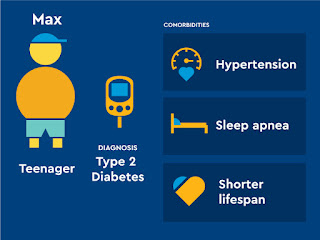CRUSH FOOD CRAVINGS WITH "ODD" 5-SEC WATER HACK.... For more details click here.....
I'm going to spend some time
discussing the importance of leptin below, but to get started with I want to
talk exactly how you diagnose this condition.
And, it turns out, that diagnosing
leptin resistance is actually quite easy.
(*Note: it's important to realize that
there isn't an agreed upon way to diagnose leptin resistance, but it is
agreed that if you CAN'T lose weight AND you have high leptin then you have
leptin resistance. I have added my own values which I find to be accurate based
on treating hundreds of patients below.)
The best way to go about doing this
is by ordering what is known as a serum leptin test.
This general lab test looks at the
total leptin hormone concentration in your blood.
If your fasted serum leptin, when
tested, is greater than 10 ng/ml AND you have the symptoms of leptin resistance
(listed below) then you have the condition of leptin resistance.
Below you can see an example of a
patient with leptin resistance and a fasted leptin level of 52.1 ng/ml.
Prior to testing, this patient was
experiencing the inability to lose weight, a cold body temperature, hair loss,
an increased appetite, and other symptoms of hypothyroidism.
It's important to realize, though,
that your leptin level will fluctuate on an hour to hour and day to day basis!
To get the MOST value from testing
leptin you MUST be in a fasted state.
I recommend that you test your
leptin on a 12 hour fast.
So if you are getting your labs
tested at 7am in the morning then you would want to stop eating at 7pm the
night before.
You can drink water during this time
but you should avoid sweeteners, coffee, creams, and any liquids that contain
calories or artificial sweeteners.
Avoiding these is critical because
they may send signals to your brain that can alter your serum leptin level and
make your lab test less reliable.
If you just wanted to know how to
diagnose leptin resistance then that's all you need to know.
What is Leptin Resistance
So what is leptin resistance,
anyway?
And is leptin a "bad"
hormone?
The answer is no, leptin is not a
bad hormone.
In fact, leptin plays an absolutely
critical role in regulating
your body weight and your metabolism.
It impacts your metabolism by interacting directly with thyroid
hormone.
These two systems play together to
help your brain set your appetite, help your brain regulate and set your
metabolism, and help your brain communicate with your fat cells.
Hopefully, this doesn't come as a
surprise to you, but there MUST be a way for the fat cells in your belly to
communicate with your brain.
And the way that they do this is
through leptin.
Your fat cells, as they grow larger,
actually secrete several hormones.
One of the hormones that they pump
out is leptin and the entire purpose of leptin is to circulate in your body and
tell your brain that your fat cells are "full".
Your brain is then supposed to
respond by INCREASING how many calories you burn each day and by REDUCING your
appetite.
The exact thing that you want to
happen if you have extra fat on your body, right?
By increasing your metabolism and by
reducing your appetite, your brain is attempting to normalize your body weight.
That's how it is supposed to work,
anyway.
Leptin resistance is defined as a
state which interferes
with this normal communication between your fat cells and your brain and one which causes persistent weight GAIN and the
inability to lose weight.
But, how do we get from the system
that is working perfectly to the system that doesn't work at all, known as
leptin resistance?
Imagine a scenario in which your fat
cells are constantly growing due to inflammation, poor diet, lack of exercise,
stress, lack of sleep, hypothyroidism and so on (sound familiar?).
This scenario shouldn't be too
unfamiliar with many of you reading this.
As your fat cells grow then continue
to produce higher and higher levels of the hormone leptin.
At some point, this increase in
leptin causes your brain to become "numb" or "resistant" to
the message.
So, even though leptin levels are
high and you have an abundance of fat cells (adipose tissue) in your body, your
brain starts to ignore the message.
This continual ignoring results in
your brain becoming resistant to the hormone leptin.
At some point, your brain starts to
ignore the leptin altogether and begins to think you are in a state of leptin
deficiency (or low leptin levels).
And, the typical response to leptin
deficiency is to INCREASE your appetite and LOWER your metabolism in an attempt
to help your fat cells grow.
This dysregulation and the inability
for your fat cells to communicate with your brain through the hormone leptin is
what causes leptin resistance.
But, truth be told, this condition
doesn't just happen overnight. It takes weeks to months of being obese before
you develop this particular problem.
Signs and Symptoms you are Leptin
Resistant
How do you know if you have leptin
resistance?
We talked about how to diagnose this
condition, but we only touched on your lab tests.
You can also identify or begin to
suspect the presence of leptin resistance by looking at and evaluating your
symptoms.
Your symptoms are particularly
important because they may be the first clue that you are starting to
experience leptin resistance in your body.
Because they are so important, I
often recommend that you monitor and track your symptoms as you undergo
therapies to see if whatever you are doing is working to treat your leptin
resistance.
Symptoms of leptin resistance
include:
·
The inability to lose weight even with calorie
restriction and extreme exercise (if
you are eating fewer than 1,000 calories per day and NOT losing weight then
that is an indicator you may have leptin resistance)
·
Extreme cravings for food even if you've recently
eaten (6)
·
A slower than normal or damaged metabolism (7) (you are burning fewer calories than normal)
·
Persistent weight gain despite attempts at weight
loss
·
Lower than normal body temperature
·
Lower than normal resting heart rate
·
Presence of other hormone imbalances (including
hypothyroidism, estrogen dominance, low
progesterone, low testosterone, or high cortisol)
Is a High Leptin Good?
This is something that causes
confusion among many people, so let's clear the air a bit.
Leptin is not a bad hormone.
The state of leptin deficiency is
absolutely a problem, but this problem does not mean that leptin is bad.
The problem in leptin resistance is
the fact that your brain and other tissues become resistant to leptin.
But leptin still plays a very
important role in regulating your weight.
So, instead of focusing on leptin,
you want to focus on how sensitive your brain/body is to the hormone
leptin.
When treating leptin resistance, you
want to monitor your leptin level, but what's most important is whether or not
you are losing weight.
If you are losing weight AND your
leptin level is high then you are in a good position (probably).
This indicates that your body is
becoming sensitive to the hormone leptin and having an elevated leptin level is
good for your body.
If you are NOT losing weight AND
your leptin level is elevated then you are probably in a state of leptin
resistance.
This is a pathological condition
which WILL result in the symptoms we mentioned above.
I typically find that patients with
very high serum leptin levels (those greater than 30 or 40) will often need to
see their leptin levels dip slightly in order to sensitize their bodies to
leptin.
What this means is that it may be
necessary for your leptin level to DROP in order to help you lose weight.
As serum leptin level drops, less
leptin is available to cause problems for brain/tissue receptors which may
increase leptin sensitivity.
But you really only want your leptin
level to drop slightly and only enough so that you start losing weight.
Once you start losing weight you
actually want to maintain a high level of leptin to HELP your body burn fat,
increase your metabolism, and normalize your appetite.
Make sense?
Severity and Treating Leptin Resistance
Testing your leptin level is very
important because the absolute level of leptin in your body in the fasted state
can help you determine just how resistant you are.
Imagine leptin resistance on a
spectrum or a continuum.
On one side you have a very minor,
relatively easy to treat leptin resistance which only causes a minor difficulty
in weight loss and one which responds to simple lifestyle changes such as diet, supplements, and exercise (8).
People who have minor leptin
resistance may only have a fasted serum leptin level in the 14-20 ng/ml
range.
On the other side, you have a very
difficult to treat leptin resistance which only responds to therapies which
include medications, hormones, supplements, and dietary changes.
People with moderate to high leptin
resistance often have a fasted leptin level greater than 40 ng/ml (sometimes
even much higher than this).
Generally, the higher your leptin
level is the more difficult it will be for you to both treat the condition and
for you to lose weight.
It also helps give you information
about what kind of therapies you are likely to need to treat your
condition.
One of the biggest problems with
leptin resistance is that it is not always appreciated in the conventional
medical community.
Doctors such as your endocrinologist
or primary care physician are probably not aware of leptin resistance or how to
treat it. As you become more leptin resistant,
the therapies that you need start to require medications
and hormones which can be difficult to get unless you have a doctor working
with you.
Treatments that fit into this
category include GLP-1
agonists, T3 thyroid hormone, dietary
changes such as those found here,
and supplements
such as those found here.
If you have severe leptin resistance
you will most likely also have to look at other hormone imbalances such
as low
T3 syndrome and hypothyroidism.
Conclusion
Leptin resistance is actually an
easy condition to diagnose and it can be diagnosed with simple blood tests
which your doctor can order.
This test should almost always be
covered by insurance and any doctor can order it.
To get actionable results, make sure
that you get tested in the fasted state.
When you get tested, I also
recommend that you check other hormones such as your thyroid system, your
cortisol, and your sex hormones.
The combination of your serum leptin
level and your symptoms can help you determine just how resistant you
are.
The more resistant you find
yourself, the more aggressive therapies you may need.
 Okay,
so this one isn't so astounding, but it is one of the most common reasons
people embark on the keto diet. So why is weight loss usually so easy on the
ketogenic diet instead of other regular diets? For all of the following
reasons:
Okay,
so this one isn't so astounding, but it is one of the most common reasons
people embark on the keto diet. So why is weight loss usually so easy on the
ketogenic diet instead of other regular diets? For all of the following
reasons:












